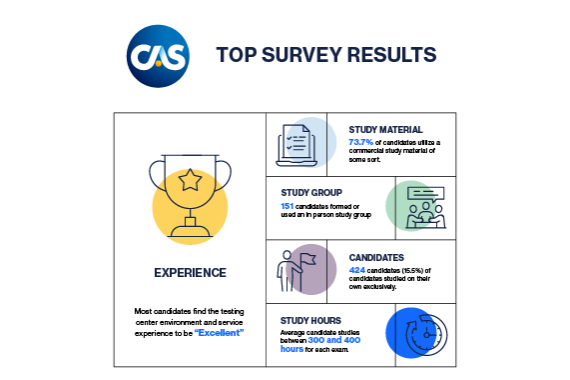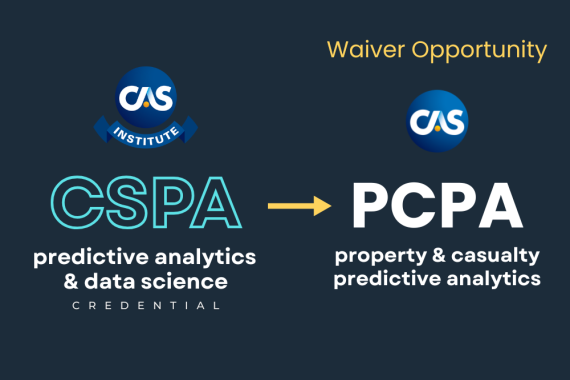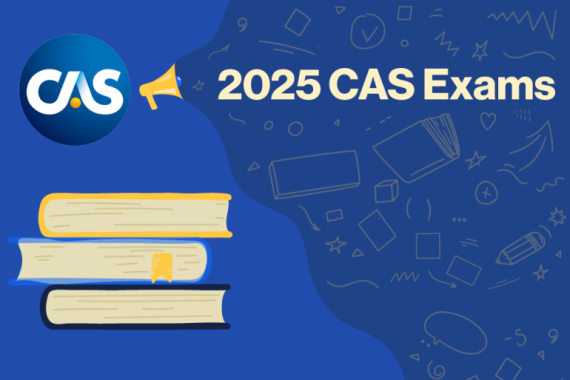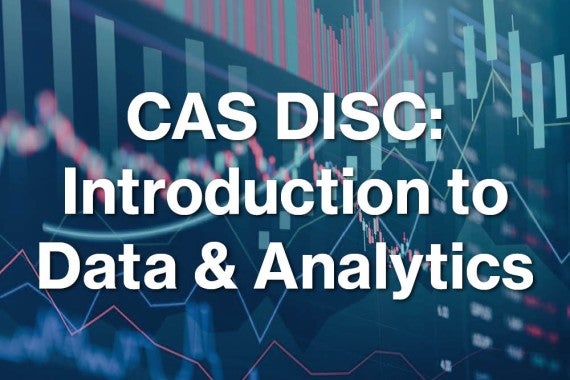Resources
Principles & Policies for Candidates
Discover the principles of the Casualty Actuarial Society for basic education, including the Code of Professional Ethics for Candidates and how to report exam misconduct.
Candidate Benefits
Active CAS Candidates – those who have sat for a CAS exam within the past two years – are invited to take advantage of a variety of benefits.
Seminars & Study Aids
Information on study aids and seminars is provided only as a convenience to CAS candidates. The CAS takes no responsibility for the accuracy or quality of the study aids and seminar announcements attached to this notice.
The Importance of Adverbs on Exams
Each CAS exam question is crafted to ensure that the question is not ambiguous and that it prompts the test-taker to provide enough information to demonstrate required mastery of the relevant subject material.
Post Exam Summary
The Post Exam Summaries consist of a general section that applies universally to all constructed response exams, followed by individual sections for each of the exams administered during the sitting.

Helpful Future Fellows Articles
Read articles and special features from past issues of Future Fellows, the newsletter for CAS Candidates.
How To's:
Study for an Exam
- Start with a plan: Review the test instructions and format beforehand, and create a plan on how to allocate time for each section of the test.
- Focus on the instructions: Read the instructions carefully before starting each section. Ensure you understand what is being asked before attempting to answer.
- Answer easy questions first: Start with the questions you know the answers to, and then move on to the more difficult questions. This will help you build momentum and boost your confidence.
- Manage your time: Keep track of time while you're taking the exam, and make sure you have enough time to answer all questions. Don't spend too much time on one question, and move on if you're stuck. Use all available resources: Use any available resources such as scratch paper, calculators, and reference materials.
- Use them effectively to help you answer questions more efficiently.
- Eliminate incorrect answers: In multiple-choice questions, eliminate any options you know are incorrect to increase your chances of selecting the right answer.
- Stay calm and focused: Keep your cool during the exam and stay focused on the task at hand. Take deep breaths and try to relax if you feel anxious or stressed.
- Review your answers: Review your answers before submitting your exam. Double-check that you have answered all questions and that your responses are correct.
- Don't give up: Finally, don't give up if you're struggling. Stay focused and keep working through the questions. Remember, a positive attitude can go a long way in achieving success in high stakes exams.
How to Find a Mentor
Getting a mentor can be a great way to accelerate your personal and professional growth. Here are some tips for finding a mentor or utilizing your network:
- Determine what kind of mentor you need: Identify the topic areas where you need the most guidance and support. This will help you find a mentor who has the expertise and experience you're looking for.
- Make a list of potential mentors: Think about people in your network who you admire and respect. Look for individuals who are knowledgeable in your industry, have achieved success in your field, or who possess the qualities and skills you want to develop.
- Reach out to potential mentors: Send a polite email or LinkedIn message introducing yourself and explaining why you are interested in their mentorship. Be clear and specific about what you hope to gain from the relationship and how often you would like to meet.
- Be open to virtual mentoring: Mentoring can take place in-person or virtually. With the rise of remote work, it's becoming more common to have a mentorship relationship over video calls or email. Consider this as an option if you're having trouble finding a mentor in your local area.
- Join a mentorship program: Many employers and organizations offer formal mentorship programs that match mentors with mentees. These programs can provide structure, guidance, and a clear path for mentorship.
- Attend networking events: Attend regional affiliate meetings and look for local conferences related to your industry or interests. These events can be great opportunities to meet new people, including potential mentors.
Remember that finding a mentor takes time and effort. Be patient and persistent, and don't be afraid to reach out to multiple people. With the right approach, you can find a mentor who can help you achieve your personal and professional goals.

Survey Says
MAS I & II Practice Exams
NEW! Practice Exam Registration
Experimental Practice Exams
Practice Exam FAQ
We've put together an FAQ to address common questions and concerns. If you have a question that we haven't answered, please contact us!
Testimonials
“I like that we get a chance to practice in the actual test environment and see all of the tutorial screens. For someone new to Pearson VUE, this would be quite helpful.”
“I liked that I got to get familiar with the Pearson Vue interface in real time, for the actual length of the exam.”
“It simulated exactly how the exam day is going to be to mentally prepare myself for when I actually get to the testing center and take my exam so that's pretty neat”
“I liked that I got to get familiar with the Pearson Vue interface in real time, for the actual length of the exam.”
“It simulated exactly how the exam day is going to be to mentally prepare myself for when I actually get to the testing center and take my exam so that's pretty neat”
CAS Continues to Expand Use of Integrative Questions
Integrative Questions (IQs) will require candidates to understand multiple facets of the syllabus material and concepts in addressing complex business problems in a single exam question.
Casualty Actuarial Society (CAS) Sample Testing
The following demonstration exams are a resource developed with questions from previous exams. The purpose is for the candidates to prepare for the exam environment by reviewing previous exam material with the features and functions of the Pearson VUE CBT environment.


Admissions Transformation, Exams & Admissions, Membership / Notices to Members


